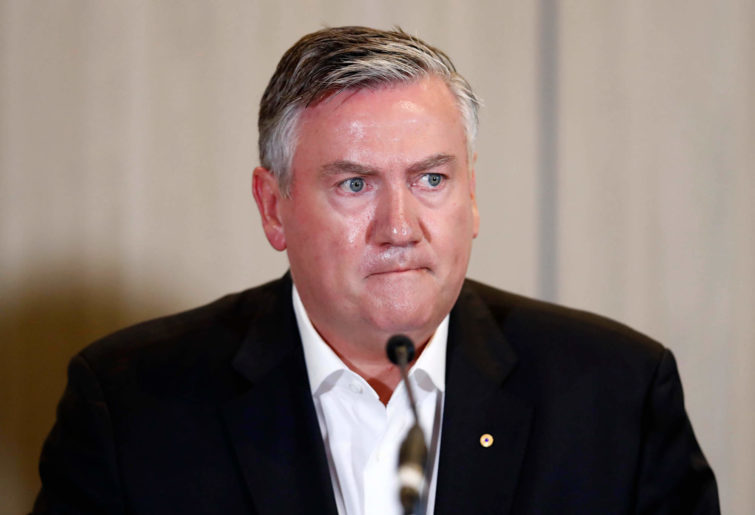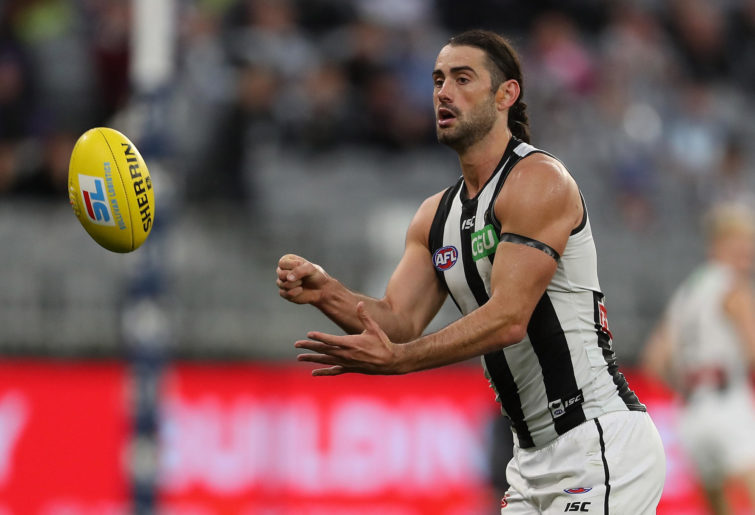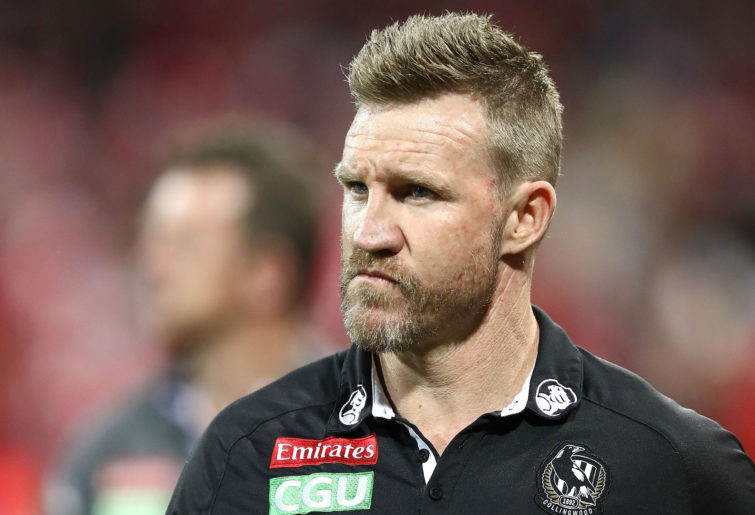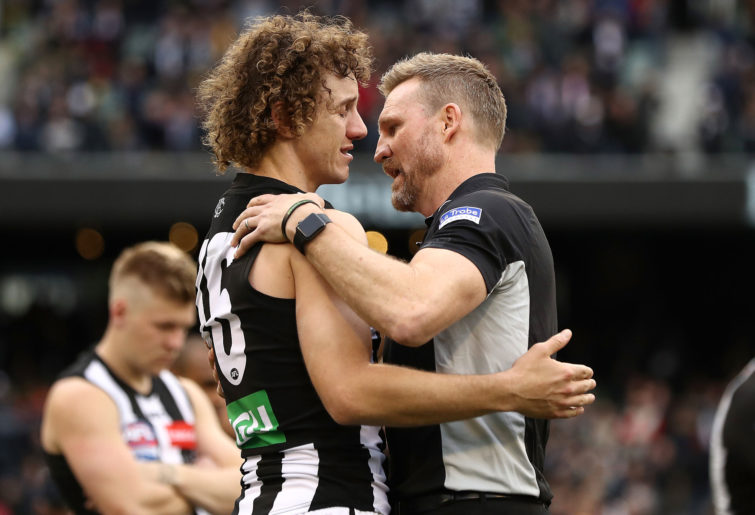The Collingwood Football Club remains an utterly amazing entity. It’s like each day, they work out a new way to disenfranchise their supporters further.
In the last six months, they’ve bungled their salary cap, clumsily shunted players out while letting it messily unfold in the media, mishandled the ‘Do Better’ report, and now they’ve elected a president from within their own ranks without enough consultation with their members.
The democratic process is alive and well at Collingwood – well, if you equate Collingwood to a benevolent dictatorship that safeguards itself from any actual democratic process.
Eddie McGuire was elected in 1999. That’s the last election I know of at Collingwood. And now, the administration – which is fast reaching the status of one of those myopic, dysfunctional corporations you see in dystopian movies, like Robocop – have decided Mark Korda is the person to lead Collingwood into the future.
On Footy Classified, former president Eddie McGuire provided a baffling explanation about the process: the members vote for the board, and they then decide the positions and the president.

(Photo by Darrian Traynor/Getty Images)
Well, I think that’s what he claimed, because later in the same discussion, he explained he hand-selected the board. Well, that’s not a vote by the members, is it? I also don’t recall the members voting for the other appointee, Neil Wilson. That was all handled internally.
McGuire descries an EGM and throwing it open. We don’t want EGMs, damn it! They’re costly and emotional and about bloodletting. No. Just let the royal family here continue their lineage unchallenged. What is it they say about inbreeding?
I don’t know Mark Korda. He might be a terrific guy. He might be brimming with new and innovative ideas. We don’t know because Collingwood has let all this play out behind closed doors. They haven’t sold him to us – the fans. He hasn’t sold himself to us like, say, a duly elected official would have to before winning our vote for governance.
If anybody suggests Collingwood doesn’t need to sell him to us, and that Korda himself doesn’t need to, well, go back to the dictatorship thingy.
The club has made a number of questionable decisions lately. You’d think they might go to their members to reconnect to them and try sell a coherent vision. You’d think they’d sell their president to the masses. You’d think the president would sell his Collingwood dream to the black-and-white faithful.
You’d think there’d be a discussion.
Nope. As usual, Collingwood would rather talk at us.
Korda seems a strange choice. He’s an insolvency expert who did not raise a single alarm about Collingwood’s salary cap (mis)management – well, that’s the way it appears from the outside looking in. Perhaps he did raise red flags and was shut down.
If the salary cap didn’t fall under his purview, why not? He would seem to have the experience and skills to provide an insight into, well, you know, financial matters.
As an aside, I’ve seen people continue to flog what Collingwood did as a ‘strategy’. I’ve written so often about this I would just be rehashing myself to go over it again, but it’s important for context, so let me offer a mini-rehash, along with some editorialisation.
Here’s the strategy that’s been sold to us: Collingwood back-ended contracts to keep a strong list together so they could try to net a premiership.

(Photo by Paul Kane/Getty Images)
Here’s the reality that’s revealed upon examination: Collingwood bloated the cap to build a list that had just two years of contention, added a player (Dayne Beams) for relatively big dollars, re-signed others (Adam Treloar, Jaidyn Stephenson, Tom Phillips, and then Brodie Grundy) to exorbitant contracts, inflating the cap further.
And yet in all this time, they did nothing to address their key position deficiencies outside of some Moneyball recruiting (an American basketballer as their full forward, a rookie defender as their centre half forward, and a fringe defender first from Melbourne, then from the Bulldogs, as their full back). And then they had to gut the list and get unders for trades, leaving themselves precariously inexperienced and lacking depth.
The way I read it, if Collingwood were not aware of their salary cap issues until too late, then they’re negligent. But if they decided this was a constructive strategy, that this was a pathway to a flag, then they’re derelict and shouldn’t be running a footy club.
Continuing to sell it as a ‘strategy’ is farcical because if it’s to be believed, it’s an all-in approach – have a so-so hand, and decide to go all in just in case it might work, but if it doesn’t you go bust, which is exactly what they’ve done. Does that seem like a good idea to anybody? Because I just can’t process it as good management any way it’s cut.
Yet we have a perpetuation of the same board that oversaw this mess, as well as the debacle surrounding the handling of the ‘Do Better’ report – either they kowtowed to Eddie McGuire while Collingwood burned, or didn’t have the courage to oppose Eddie McGuire and let the club burn.
And the club has burned, regardless of what the swamp realtors try to sell you.
The supporters are hurting. I’m not talking about the zealots who’ll overlook any issues, or rationalise them and shift goal posts until they can find some qualification for what’s going on, however warped that qualification may be. Or those who ask us to blindly trust the club because, like a fairy tale, everything works out in the end even when it’s proven that it doesn’t.
I’m talking about the people who dare to question – and are doing so passionately, eloquently, and constructively. Check social media. Check responses to Collingwood posts on Facebook and Twitter.
While I appreciate that trolls exist who enflame for the sake of whatever juvenile satisfaction they derive, what we’re seeing is genuine people hurting genuinely. Their queries should not be dismissed or marginalised.
Nobody can look at Collingwood right now and say they are in a good place: sitting 1-4 on the ladder, their coach out of contract and unlikely to be there next season (with Nathan Buckley increasingly appearing as if he’s accepting that), the game plan still struggling for cohesion (and after all this time, we know it won’t consistently or sustainably gel), key retirements looming over the next two to three years, an imbalanced list with so much unprepared, untried youth that once those retirements occur a chasm will open up (as we’re already seeing), membership down, sponsors fleeing, finances under question, and the future so problematic.

(Photo by Ryan Pierse/Getty Images)
But, hey, let’s all get together for a rousing rendition of “Good old Collingwood forever”! That’ll fix everything – that same fanatical patriotism that exists only to continue to try sell the same message: that Collingwood is the greatest club in Australia, and should you dare question it then you are disloyal, you are not a real supporter, and you are part of the problem.
I’ve followed this club for over 40 years, and as far back as 1982 I could tell you Collingwood wasn’t the greatest club in the country. As a wide-eyed, naïve, adolescent supporter, I saw Collingwood’s stature as the premiership leader cede to Carlton: first when Carlton tied Collingwood for 13 flags in the 1981 grand final (typically, beating Collingwood), and then passed them by winning the flag in 1982 (against Richmond).
Just for some context over this two-decade window: Carlton won flags in 1970, 1972, 1979, 1981, 1982, and 1987, Richmond won flags in 1973, 1974, and 1980, and Hawthorn won flags in 1976, 1978, 1983, 1986, 1988, and 1989. Essendon won flags in 1984 and 1985, that second flag taking them past Collingwood on the premiership table.
How anybody still believed Collingwood were some premiership powerhouse while all this was going on around them, as their stature deteriorated and other clubs passed them, and as next generation supporters flocked to the successful, is beyond me.
The club’s boasts about being the greatest clung to a history that had been made so long ago, it was only relevant as exactly that: history. We might as well espouse Australian cricket’s ‘Invincibles’ – the Australian team that toured England in 1948 and went unbeaten – as proof that the current Australian side is still the greatest in the world.
We can respect history. We can respect the foundations on which the club is built. We can respect that a club is an entity that ultimately spans generations and will have highs, and lows, and continue to evolve. And, yes, Collingwood has a magnificent and storied history that they should be proud of – there is no disputing that. It irks me when people qualify history as an era that was unprofessional, or inferior, or unworthy by today’s standards. It all matters.
But, in the end, all we have is now, and right now Collingwood cannot keep selling the same message. Collingwood cannot bluff their way through what’s going on. Collingwood cannot keep expecting blind faith from a supporter base they’ve flagellated with the joyful obliviousness that they lose grand finals.
And yet their default position seems to be to try and power through every crisis, every misstep, every doubt, as if they know no wrong, have done no wrong, and can never be wrong. Are they really that obtuse? Do they really believe that offering this claim to stability actually translates to anything meaningful? Or that it’ll correlate with positive, constructive change, as well as evolution? If so, take a look at the club again.
Collingwood hasn’t been evolving since their 2018 grand final appearance – the peak of their current coach’s tenure.
They’ve been devolving.

Chris Mayne and Nathan Buckley. (Photo by Ryan Pierse/AFL Media/Getty Images)
That’s not an opinion. Look at their finishes. Look at their salary cap management. Look at their list. Look at their membership figures.
It’s all statistically qualifiable, although I’m sure somebody will try to sell me the claim that everything is great, it’s all going to plan, and we’re loading up to go again. Um, yeah. Okay. Four years of rebuilding for a two-year window of contention, and here we go again.
Every club that has become a powerhouse in the modern era has spring-boarded from a period of accountability and self-awareness – a time where they’ve consciously taken stock and acknowledged that everything they’ve known is no longer relevant, and a new plan is needed.
Enough has happened at Collingwood that you would hope this self-examination is occurring, but judging by how they’ve foisted a president upon us who’s been there for 14 years and a party to the issues that now plague the club, it just feels like more of the same.
































































































